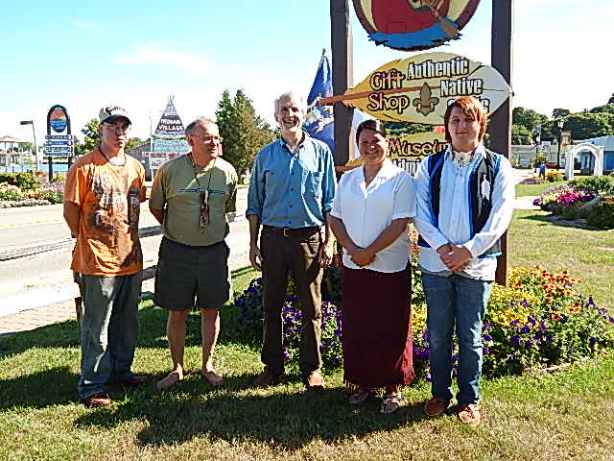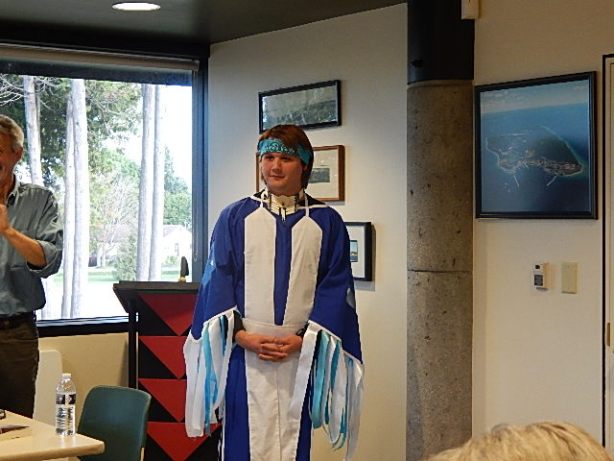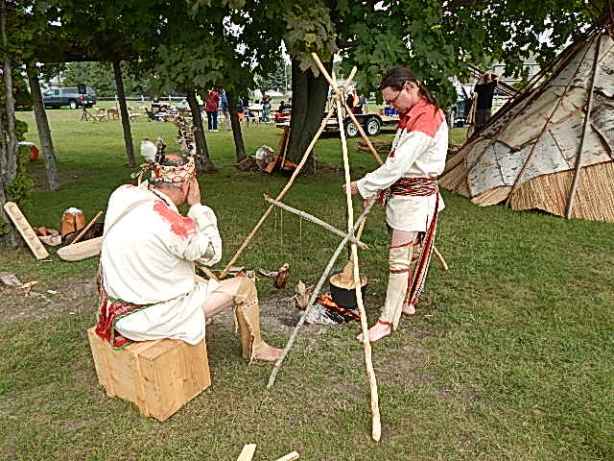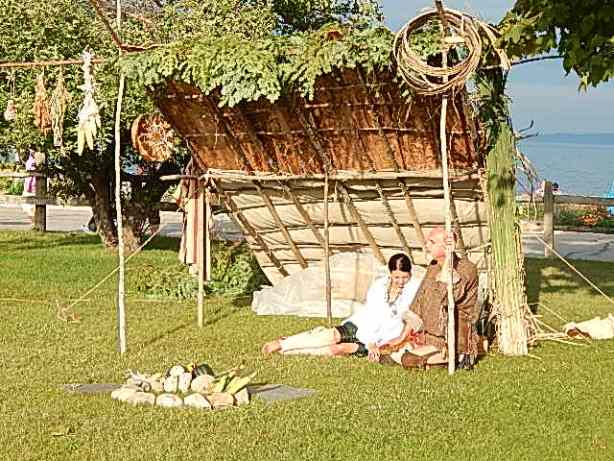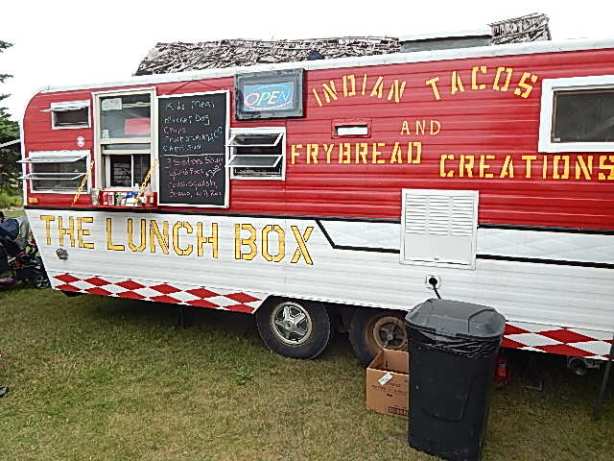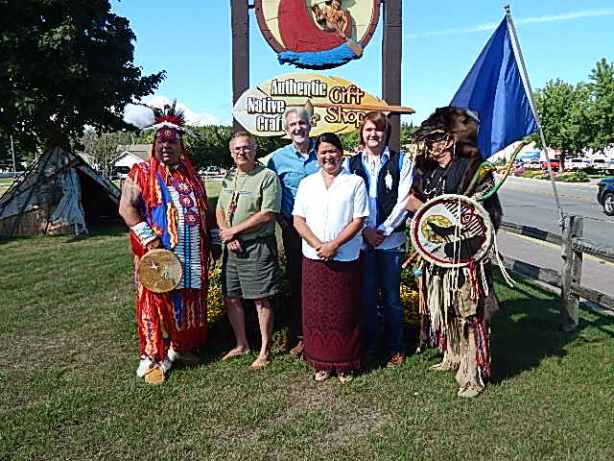You asked for it. Well, sort of. I asked you to ask for it. And someone did, a couple of you did, fans of ‘The 53rd Parallel’, and I’m easy and quite pleased with what is happening in the first chapter of the second book of The River of Lakes Trilogy, so here. And then I thought, why not share the first half of the second chapter as well.
The plan now is to publish ‘World’s Between’ in the Spring of 2015. I hope you enjoy it.
Chapter 1: A child is born
This Man stood on the alert outside the door of the large wigwam, his flintlock primed and at the ready; he had tied a sprig of cedar together with a hawk feather near the muzzle of his gun. The people of the village and the visitors were gathering around the wigwam and two of the men carried rifles; Brian Burke had his recently purchased Marlin 336 and Albert Loon carried the old Winchester that had been in his clan for as long as he could remember; both rifles were lever-action, both 30-30’s.
From inside the wigwam a woman’s hard moans and deep groans suddenly became sharp cries and the cries grew and grew into calls of the purest pain that lasted, the men thought, much too long until a sharp bark of agony was followed by a moment of silence, inside the wigwam and outside, and then by the baby’s first wail, greeted by the joyous relief of many voices, from inside the wigwam and then outside.
Brian watched for Albert’s indication to fire their rifles as he listened for news from inside and hoped to hear his invitation to enter.
Inside the wigwam Maureen received her new born baby from the Nokomis who had received it from the Ojibway midwife who had attended Maureen throughout the later stages of her pregnancy and presided over the delivery, observed by the delivery nurse from the hospital in Kenora who Brian insisted at least be present.
Mary Fobister, Maureen’s closest friend, was the other woman attending; she had supported Maureen, propping and balancing her, holding her up, stroking her and comforting her, during what became a furiously fast delivery.
From inside Maureen called out to her husband “Brian, it’s—” just as This Man raised his gun to his shoulder and aimed high above the trees out over the River, the talisman at the tip of his gun’s barrel waving it’s magic in the breeze, and Brian and Albert raised their rifles together and in the same moment Maureen’s voice called it was greeted by the thunder of the rifles proclaiming a child is born.
Brian exchanged handshakes with his closest friends and everyone stepped forward to touch him and offer blessings and Maureen was calling him in as the nurse from Kenora emerged from the wigwam door with a sweet smile of wonder on her face and assurances in her voice as Brian handed his rifle to Albert and knelt to enter.
Maureen looked up at him, exhausted, her hair sweated to her face; Mary moved back to make way for Brian who crouched in next to his wife and baby. Maureen whispered “Grace O’Malley Burke has come to live with us.”
He patted his wife’s shoulder, studying her status, then touched the little one’s shoulder with his finger. “Our little lass. You were right, we’ve got our little lass.”
“I never doubted.”
“That sound she made, ah, it was grand.”
“You should have felt her fightin’ her way out into the world, yeah.”
Brian looked around at the interior of the wigwam and shook his head.
“An’ you were right about all of this as well.”
“I’ll tell ya now, I was glad you brought the nurse in. It was comfortin’ to see her there.”
“But you didn’t need her.”
“We didn’t need her.”
“All because you wanted our daughter to be born in a wigwam.”
“No, because I wanted our daughter to be born with her people gathered ‘round.”
Chapter 2 Guests and Visitors
The Great Lodge Hall at Innish Cove—the grand building Brian had dreamed of and Maureen had planned for from the beginning—took two years to build and was completed the same year their daughter Grace O’Malley Burke was born, in 1953. Maureen supervised the great extent of the construction well into her pregnancy and only in the final days did she leave it to Brian to finish the work on the massive log structure that captured under one vaulted roof a full dining room; a great rock fireplace and its sitting area; a pub corner with bar and tables and billiards; and a spacious kitchen with two stoves and two ovens, three sinks deep and wide, a walk-in pantry big enough for flour barrels and plenty more, and a work area.
Two weeks after Grace O’Malley was born Brian and Albert Loon and the younger men and boys of Joe Loon’s clan took the tables and chairs and the two-way radio and kitchen supplies out the cabin that from the first days of operation had served the camp as the guests’ dining hall and moved them into the Great Lodge Hall—the first few tables seemed lost in the dining room’s full expanse—and the guests were served supper there for the first time the middle of that summer. Brian and Maureen held their baby daughter between them as they entertained their guests with stories of the founding of the Great Lodge at Innish Cove.
The fourth summer following that first meal in the Great Lodge Hall, as the evening brought a delightful cool to a sun blazing mid-August day, Brian and Maureen stood together in the pub visiting with guests after supper. During his only trip back to Ireland to visit his children—Tommy and Katie were present to him; Patrick was determined to keep his distance—Brian collected Guinness signs and posters, including the poster of Toucan balancing a pint on his beak under the headline ‘Lovely Day for a Guinness’.
This sign was centered over a row of bottles, one each of every sort of Irish whiskey, and not just Bushmills and Jameson, but Inishowen and Black Bush, Redbreast and Greenore and Tullamore Dew, and nearly a dozen others Brian also collected on the trip. He found that whether the guests drank the Irish or simply toasted them, they all enjoyed the look of the labels.
The pub opened out onto the Great Hall’s dining room now crowded with tables where some guests who had stayed out on the River’s lakes until late were just mid-meal while others were finishing their steak and potatoes and some sat back to sip an after-supper coffee, freshly brewed. Guests at two separate tables began the first rounds of their four-handed gin games in the Great Hall before they would retire to their cabins with their cards and their drinks and stories of the day’s adventures fishing the River and its lakes with good friends.
The supper tables were cleared and cleaned by two teenage Ojibway girls, dressed in white blouses and long black skirts that Maureen selected, each using red ribbons to tie back their shiny black hair. It only took one guest to engage the girls enough to get past the reserved quiet and natural shyness the girls maintained around guests and then finally work out that the girls weren’t sisters as most guessed but cousins, the tall one Ruthie Strong, the younger girl Sweet Marie, and the collected information was then passed on over the summer from guests to guests as the arcs of trips overlapped.
The Great Hall was covered by a vaulted ceiling, and its log walls were nearly fourteen feet high. Even so the walls were already crowded with the visual evidence of delighted guests. Moose heads were the largest and hung highest; black bear heads were most dramatic, with their toothy snarls. Trophy mounts of northern pike, walleye, smallmouth bass, lake trout, Canadian geese, and the antlered heads of white tail deer were most plentiful. Small bits of brass tacked to the trophies’ wooden frames noted the hunters or fishermen and the days of their success.
Scattered around them, placed among them, were photographs, mostly black and white, of guests with this trophy or that one, some photos a series that captured seasoned regulars, some with guides included, a couple of guests quite renowned, others near famous.
Maureen was the first to retire from the work of entertaining guests, though she would stay as long as any female guests were in the Great Lodge. That wasn’t often. The guests were men; successful men; men traveling with their fishing and hunting clubs; men and their young son and men with their adult sons; men with their business associates; and so it was this evening as Maureen attended to last details in the kitchen before she left for the night. When she determined all was ready for breakfast in the morning she returned to the Great Hall to locate young Grace O’Malley, expecting her to be sitting with guests while they told her their stories or she told them hers. She remembered the last place she’d seen her daughter playing and she spied her there still.
Grace O’Malley was asleep, in the arms of a guest. The top of the little girl’s head lay nestled against the edge of the guests’ grey and white beard. Earlier in the evening Maureen had checked with the guest to make sure Grace O’Malley’s play wasn’t tiring him out and he had winked back at Maureen over his toothy grin and told her to go away. They had been playing some sort of hidden ball game then, but now she was lying on Ernest Hemingway’s chest, nestled in his arms, as he sat back in a big overstuffed chair by the fire. Hemingway’s son Patrick and their two friends spoke softly so they wouldn’t disturb the scene. The quiet corner setting had been Hemingway’s all four nights he had been in camp. Maureen directed Brian’s attention to the scene, then said good night to the guests she passed at the billiards table on her way to Hemingway’s corner.
He saw her coming, grinned again, and spoke softly now over the child’s head.
“I love sleep. My life has a tendency to fall apart when I am awake, ya know.”
Maureen smiled down at her daughter and Hemingway stroked the girl’s wavy black hair as he looked up at Maureen.
“You’ve got a gift for naming things.”
“Namin’ things?”
“This place is surely the Great Lodge at Innish Cove. And I’ve heard tell the legendary stories of the pirate queen of Ireland back there in Elizabethan times, Grace O’Malley.”
“Outside our own, not many know of her. Brian’s ancestors married O’Malleys.”
“She’s a warrior one moment, a princess the next, and always of the most extraordinary kind.”
“Well, see, she is small for her age, she’s four, I think folks are comparin’ her to two and three year olds.”
“I’m not comparing her to anyone or anything. I am just appreciating the powerful beauty that informs who she is and so much of what she does.”
Maureen smiled. “Well, thanks. All of you, you’ve been just too kind an’ so patient with her, with your playin’ an’ all your attention.”
“Child’s play is its own reward. I was long ago a convert to it, child’s play, the joy of joy. Seems I’ve forgotten it lately.”
“You bring her joy. She’ll miss you.”
Maureen reached for Grace but Hemingway held her there. “Ah, but the weight of her feels good on my chest.”
“See now I’m bein’ selfish here for I can’t settle into my own bed until I know this character’s safely tucked into hers. Unless you want me sleepin’ on your other shoulder, so…”
Hemingway raised the child but Maureen knew she needed to do most of the lifting as she’d noticed time and again as he made his way around the camp and in and out of boats that the pain he lived with had weakened him. She bent quickly to collect Grace O’Malley into her arms, held her close with the girl’s head resting on her shoulder, and addressed the guests with her smile.
“Your plane’s here half-eight. Just leave luggage at the cabin door when you come up for breakfast an’ we’ll be by to collect it.”
And that’s how it starts.

